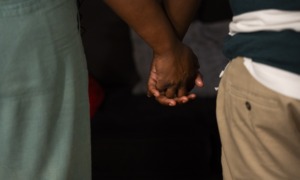If reauthorization of the Juvenile Justice and Delinquency Prevention Act of 1974 is the gold medal for juvenile justice advocates, passage of Rep. Bobby Scott’s proposed Youth PROMISE Act would definitely be the silver.
The act would put billions of dollars toward keeping youth away from the violence of street gangs, and not by placing them in jails. It would allow community councils in areas with lots of youth at risk from gangs and violence to create plans aimed at filling the voids in youths’ lives that make them receptive to gangs and crime.
It’s a big price tag in tough times, but Scott says most potential PROMISE Act areas could balance the cost of crime prevention against expected savings on incarceration and welfare, which he estimates can add up to nearly $100 million a year in small- to medium-sized cities.
“If you can reduce crime by 50 percent, and these places have the potential to do that, … you ought not limit your imagination to programs that cost $200,000 to $300,000,” Scott (D-Va.) told JJ Today on the phone, the day after he hosted a four-hour summit on the act in the Rayburn House Office Building.
In a lot of ways, the formula in Scott’s legislation is reminiscent of the Department of Labor’s Youth Offender Grant process: grants for planning, then grants for implementation, and establishment of a best practices/research entity to assist. The big difference is that PROMISE Act would enable a collaboration of groups to craft a plan and recommend grantees (Youth Offender uses local governments).
On the House side, the stars are aligned for Scott. Sources say the bill would be passed easily in the new Congress that convenes in January and make it to a House-Senate conference quickly if he Scott chose to push it through his own Judiciary subcommittee on crime, terrorism and homeland security. And asked what President-Elect Barack Obama thought about the bill, Scott said, “I’m positive he would sign it.”
But there is an obstacle in the way of PROMISE Act’s coronation, and that is the U.S. Senate. There is no perfectly symmetrical legislation in the works in the Senate yet, and if the PROMISE Act passed soon, it would be likely to end up in a conference with the Gang Abatement and Prevention Act, sponsored by Sen. Dianne Feinstein (D-Calif.), which passed the Senate unanimously last year.
Feinstein’s bill focuses predominantly on the suppression of gang activity through greater law enforcement involvement and broader definitions of gangs. Most juvenile justice advocates support PROMISE and oppose Gang Abatement (for a sense of those views, read this from the National Council on Crime and Delinquency and this from the National Juvenile Justice and Delinquency Prevention Coalition.
Scott made it abundantly clear to JJ Today that there would be no compromise between his bill and Feinstein’s. “The fact is, there is no research that would lead anyone to believe that increasing penalties from where they are now would do anything to reduce crime,” Scott said. “People are so accustomed … to expect counterproductive nonsense as part of crime bills. Why accept more juveniles tried as adults when that increases the crime rate?”
So a new bill on the Senate side, more closely connected to the PROMISE Act, would be necessary. Scott indicated that he has some senators in mind as sponsors. The summit this week was really a pep rally to stir up support for January visits to Capitol Hill by advocates of Scott’s bill to senators from their states.
To be continued!





























